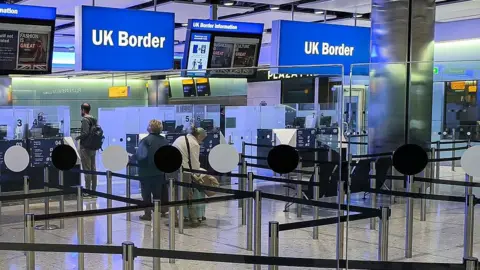In an important announcement made recently, the UK government is set to implement new regulations regarding permanent settlement for immigrants, a move that could significantly extend the wait times for individuals currently residing in the country. Under the proposed plan, migrants will be required to reside in the UK for a total of ten years before being eligible to apply for indefinite leave to remain, which is a dramatic extension from the existing five-year requirement.
The implications of such a change are significant. Previously, it was unclear whether this new ten-year timeline would apply to the approximately 1.5 million foreign workers who have entered the UK since 2020. However, reports from the BBC indicate that forthcoming official documentation will clarify that this extended waiting period will indeed apply to both current migrants and new visa applicants seeking permanent residency.
This decision by the government is poised to stir public discourse, as it will include a public consultation phase. It stems from concerns raised by Home Secretary Yvette Cooper regarding a potential surge in applications for settlement and citizenship. With net migration hitting record highs — reaching approximately 906,000 in June 2023 — it appears the government aims to manage the influx of incoming residents more stringently.
Despite the extended period for most migrants, the government will continue to honor a five-year requirement for non-UK dependents of British citizens. Moreover, there are provisions for shorter waiting periods for individuals who can demonstrate significant contributions to the UK’s economy and society. These nuances might offer some relief to specific groups, but the broad extension could lead to feelings of uncertainty among many individuals who were already navigating the path to permanent residency.
Labour MPs have raised valid concerns regarding the potential implications of such a lengthy qualifying period for individuals already living in the UK. One prominent MP, Florence Eshalomi, expressed that constituents are experiencing understandable anxiety, with some even contemplating leaving the UK due to fears that their settled status could be at risk. Cooper has reassured MPs that the government plans to provide additional clarity on this matter later in the year, along with a consultation process to gather public opinion on the new regulations.
The Migration Observatory notes that by adopting a ten-year settlement route, the UK’s immigration framework will become more restrictive than those of many other affluent nations, albeit comparable to countries like Switzerland and Japan. However, it appears that while this move may not drastically alter levels of migration, it will likely result in increased revenue from visa fees paid by temporary residents.
A substantial concern surrounding these changes is the protracted duration without the rights afforded by permanent residency. Migrants will face extended waits for essential rights such as the ability to live, work, and study indefinitely in the UK, as well as access to public benefits. Furthermore, permanent residency is often a precursor to applying for British citizenship, a vital goal for many immigrants.
Critics of the policy, including Enny Choudhury, the co-legal director at the Joint Council for the Welfare of Immigrants charity, have vehemently opposed the new rules, labeling the decision as a “cruel betrayal.” Choudhury pointed out that these individuals are already part of UK society, having established their lives and communities, and altering the criteria now threatens to plunge many into a state of confusion and financial distress.
Ultimately, while the UK government asserts that this measure is intended to manage immigration better, the new regulations raise profound questions about the treatment of existing and new migrants. A system that can accommodate both the country’s needs for security and the aspirations of individuals seeking a new life may require more thoughtful solutions than merely extending waiting periods.
As public consultations begin and further details emerge, the focus will be on how the government aims to balance its immigration objectives while considering the voices and experiences of those affected by these changes.



